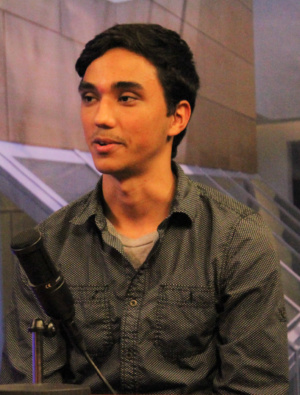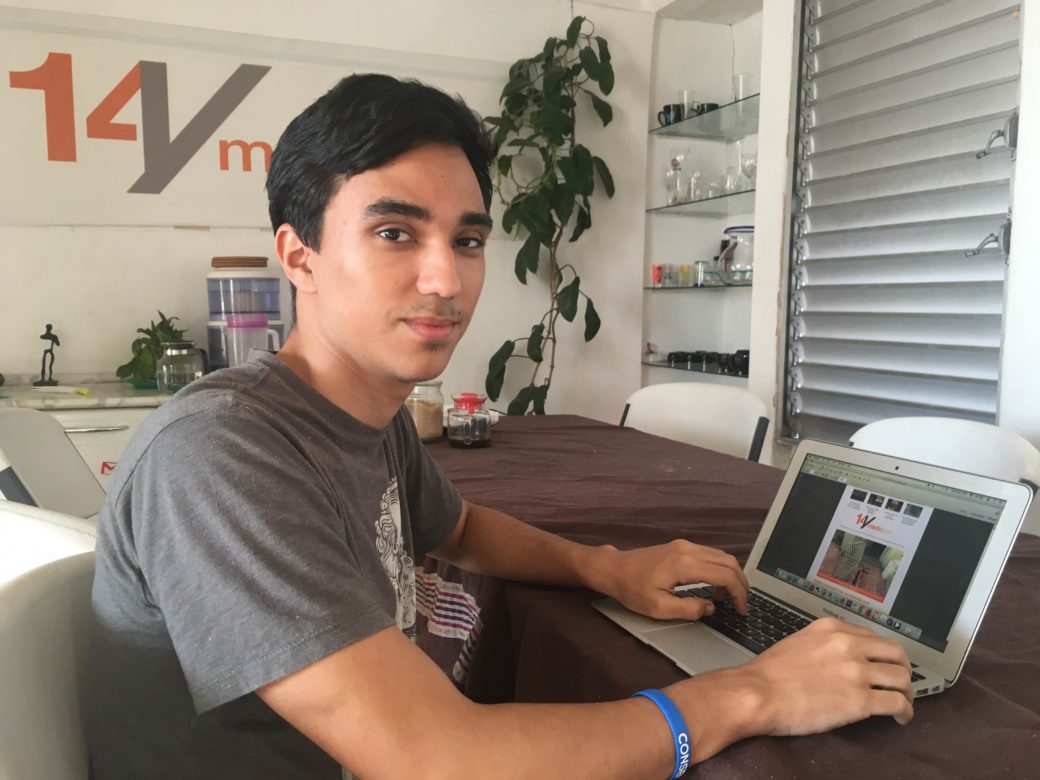TEO SANCHEZ ESCOBAR
Havana, Cuba | Reporter, 14yMedio
Alfred Friendly Fellow | Host: New Tropic, Miami
By Smitha Rajan |
Long before he wrote his first news article, Teo Escobar understood the perils that await a journalist who insists on pursuing the truth in Cuba.
His mother, dissident Cuban blogger Yoani Sánchez, has been arrested, threatened and subpoenaed several times for her criticism of the ruling communist party.
His father, Reinaldo Escobar, has also been arrested for his reporting about sensitive issues in Cuba. The elder Escobar is now the editor-in-chief of 14ymedio.com, founded in 2014 by Sanchez as Cuba’s first independent daily digital news outlet.
“Although I have not personally been threatened, I have seen my family go through it,” Escobar said. “I know how it is to be at the receiving end of the government’s ire.”
However, Escobar did not plan to be a journalist.
“I once tagged along with a friend for a training (session) in video editing and shooting,” he said. “A year after 14ymedio was launched they were on the lookout for people with multimedia skills.”
Escobar was invited to join the staff, and now he works as a correspondent for 14ymedio. “My earlier chance training helped me get the job.”
He has also written for The New Tropic in Miami, where he covered subjects as varied as environment, politics and immigration. He is particularly passionate about technology and entrepreneurship topics.

When not chasing a story or editing a video, Escobar plays the guitar and pursues his love for language. He is fluent in Spanish and English, understands German, and is busy mastering Japanese.
On his experience of working as a journalist in Cuba, Escobar said it was a story on Cubans’ thought about Donald Trump’s election that brought him face-to-face with the fear in which people live in his country. “We wanted people to give their reaction to the election results but many refused to air their opinion for fear of being taken to task by the government,” Escobar said. “It was a shock to me. The only ones who gave a comment were those who were persona non grata or those who knew us (14ymedio) personally.”
Escobar was assigned to write a reaction story about President Barack Obama’s decision to end the privileged policy for Cuban immigrants, known as the “wet foot, dry foot policy.” It allowed Cubans without a visa to apply for permanent residency if they physically made it to the U.S. land.
Escobar found that many Cubans were upset about the change. “I already knew many Cubans did not want to stay in Cuba but that incident made me more conscious about how pervasive the feeling was. How are we to bring change if all that we think of is abandoning our nation.”
With the knowledge gained from the Alfred Friendly fellowship, Escobar plans to teach fellow journalists in Cuba how to pursue investigative journalism using digital tools.
“I can help them exploit the potential of social media to communicate and engage the audience back home,” Escobar said. Cuban journalists could take advantage of new mobile journalism tools, he added.
He said he now has a better understanding of copyright policies and authors’ rights, which can aid his fellow journalists operate more professionally and ethically.
Rather than journalism or philosophy, Escobar’s childhood dream was to be Cuba’s president. But the 21-year-old philosophy student now aims to eventually become a professor because “no one works as a philosopher” in Cuba. “Perhaps I can teach journalism. Who knows?” Escobar said. Until that dream materialises, he plans to continue to be a journalist.
Like his parents, Escobar said he will tell stories that the government does not want to be told. “I will pursue objective journalism irrespective of whom it upsets.”

We were treated to our first baseball game in the U.S., the Missouri Tigers against the South Carolina Gamecocks


